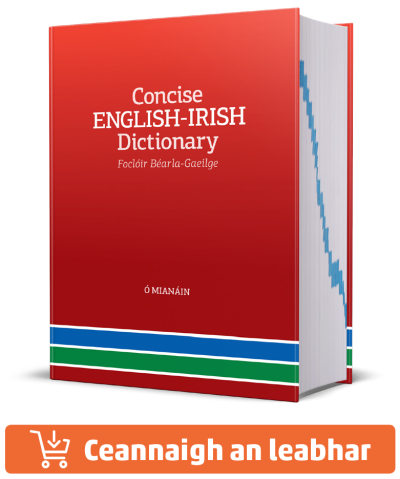Foclóir Gaeilge–Béarla
Ó Dónaill, 1977
An Foclóir Beag
Ó Dónaill & Ua Maoileoin, 1991
English–Irish Dictionary
de Bhaldraithe, 1959
Gramadach
Foghraíocht
spóirse
spóirseach
spóirt
spóirtín
spóirtiúil
spoitseáil
spoitseálaí
spól
spóla
spólaire
sponc
sponcach
sponcán
sponclus
sponcúil
sponla
spontáineach
spontáineacht
spor
spór
spóra(i)-
sporach
Seans gur foirm é spoke de:
speak »
CUARDACH DROIM AR AIS
IN FOCLÓIR GAEILGE—BÉARLA
ABAIRTÍ
IN FOCLÓIR GAEILGE—BÉARLA
A ghéire a labhair sí, how sharply she spoke.
Labhair sé liom, amhail ~ dá mbeadh aithne aige orm, he spoke to me as if he knew me.
~, d’~, gur labhair mé leis, although I spoke to him.
Is tú an t-~ duine (amháin) a labhair liom, you are the only person who spoke to me.
Labhair sé as fearg, he spoke in anger.
Labhair mé mar a tháinig chun an bhéil chugam, I spoke at random.
Ní raibh as a bhéal ach é, he spoke of nothing else.
Labhair mé ~ ar bhéal leis, I spoke to him face to face.
Is ~ a labhair sé, he spoke badly, made a poor speech.
Tháinig ~ air nuair a labhair mé leis, he sulked when I spoke to him.
Níor chan mé ach an fhírinne, I spoke only the truth.
Chuir sé ~ orm, he addressed me, spoke to me.
Cé hé (hí, hiad) a labhair leat? Who is he (is she, are they) who spoke to you?
Níor labhair ~ againn, neither of us spoke.
Ní raibh cor ná ~ astu, they neither moved nor spoke.
Labhair sé go ~, he spoke sharply, angrily.
Labhair sé go corraithe, he spoke with feeling, heatedly.
An chúis ar labhair mé, the reason I spoke.
Níor labhair aon ~, nobody spoke.
Is ~ a labhair sé, he spoke sullenly.
Labhair sé le h~, he spoke strongly, to good effect.
Labhair sé go ~, he spoke out loud and clear.
Dúirt sé an fhírinne, he spoke the truth.
~ rotha, spoke of wheel.
Is ~ a labhair sé, he spoke very fast; he was quick to speak.
B’~ teanga dóibh, they spoke the same language.
~ sé ar an teileafón liom, he spoke to me on the telephone.
~ sé i nGaeilge, he spoke in Irish.
~ na gunnaí, the guns spoke.
Ní raibh ~ as aon duine, no one made any sign of movement, spoke a word.
Is ~ a labhair, I am sorry I spoke.
Bhí ~ ar gach focal aici, she spoke ever so sweetly.
Níor labhair sé ní ba mhó, he spoke no more.
Bhí ~ ar a chuid cainte, he spoke venomously.
~, is mairg a labhair! Oh, I’m sorry I spoke!
Níor labhair sé ~ air, he never spoke of it.
Tháinig an chaint go ~ chuige, he spoke easily, fluently.
~ sé nuair a labhair mé leis, he gave a sudden start when I spoke to him.
Labhair sé ar a sheal, he spoke in his turn.
Ní hé a mhac ~ ach mo mhacsa a labhair leat, it was not his son but my son who spoke to you.
~ sé tamall sular labhair sé, he pondered a while before he spoke.
Thug sé ~ dá theanga orm, he spoke sharply to me.
Labhair mé ar do shon, I spoke on your behalf.
Labhair sé go borb, agus níor thaise liomsa é, he spoke angrily, and I replied in kind.
An ~ is túisce a labhair, he who spoke first.
Bhí a theanga ina leathbhéal, ina leathphluc, aige, he spoke with his tongue in his cheek.
Labhair siad ~ ilbhéarlaí, they spoke in divers tongues.
Bhí ~ ghalánta ar a chuid cainte, he spoke in a genteel tone of voice.
1. An té is ~ a labhair, the person who spoke first.
Ón ~ dheireanach a bhí mé ag caint leat, since the last time I spoke to you.
